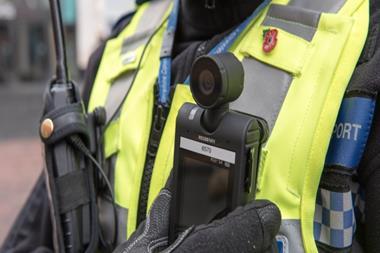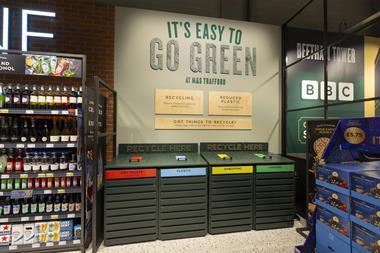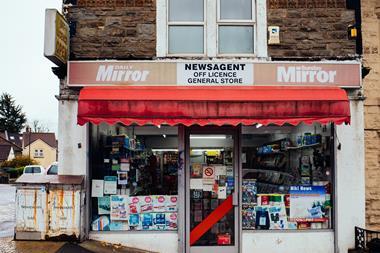This week Andrew Lansley outlined the contents of the Public Health White Paper – and the role he wants industry to play. Nick Hughes reports
The sight of Andrew Lansley standing in front of TV cameras on Tuesday expounding his policy to "nudge" people towards healthier choices may, to some onlookers, have seemed rather contradictory.
Hours earlier at the launch of the government's White Paper on public health, the health secretary had declared his intention to ban below-cost alcohol selling and make tobacco companies package cigarettes in plain brown wrappers. Simultaneously, the Treasury had announced plans to increase the tax on strong beer (over 7.5% abv), while reducing the duty on weak (under 2.8% abv) in an effort to curb binge drinking.
Nudge? More like push becomes shove. But then, the coalition government's first strategic paper on public health since the election represents a radical step-upping if not shift in direction of policy under Labour (after all, the cigarette branding ban was mooted under Labour without support from the Tories though later ditched). The question is: what role will industry be asked to play in implementing this much-trumpeted change? And does it or consumers buy the distinction between being nudged and nannied?
The paper is disappointingly short on detail about the government's controversial "responsibility deal" with industry, but there were enough hints dropped by Lansley and public health minister Anne Milton during Tuesday's briefing to shed some light on the implications of the change in stance on public health.
Booze and fags are, unsurprisingly, the biggest losers. A policy to ban below-cost selling of alcohol will be taken forward as a matter of urgency by the Home Office, which will also seek to overhaul the Licensing Act to give local authorities and police stronger powers to remove licences from, or refuse licences to, any clubs, bars and pubs causing problems.
Lansley is also promising to look at whether the plain packaging of tobacco products could reduce the number of young people smoking. However, there remains indecision on if and when the tobacco display ban will come into force, much to the frustration of convenience retailers. "Retailers are being treated disgracefully by ministers, they have waited months for a straight answer and yet again none has been given," says ACS chief executive James Lowman.
One issue conspicuous by its absence is obesity, Lansley preferring to hold fire until the publication of a Public Health Responsibility Deal in the spring.
But behind the scenes the wheels of change are already in motion. The Department of Health has established five networks of stakeholders on food, alcohol, physical activity, health at work and behavioural change that form the pillars of the responsibility deal with business. Lansley will sit on the panel of each network, a move welcomed by one industry figure.
"His hands-on involvement shows how high-level the commitment is and will also stop any squabbles that have been evident in the past between the disparate groups of organisations that participate," says Kellogg's communications director Chris Wermann. "If you're not there to contribute to the greater good, Lansley makes it quite clear you're not welcome at the table."
Wermann believes the paper could provide a jumping off point for a mutually beneficial relationship between government and industry. "I think it totally lived up to pre-election promises. I think it's spot on in terms of nudging and not nannying, which is very much the big society agenda."
Kellogg's will be heavily involved in one of the few concrete industry-backed initiatives set out in the paper. The Change4Life campaign will be developed through a 'Great Swapathon' where consumers will be able to exchange £250m of partner-funded vouchers for healthy food options. PepsiCo and Kraft are also believed to have signed up.
The direct involvement of big business in public health strategy has been criticised in some quarters of the media, but Lansley stresses that his vision requires all stakeholders to pull together. "If there was a simple regulatory approach we would have done it years ago," he says. "What we're looking to do is make progress more quickly through a co-operative approach."
Government officials, business representatives, NGOs and other stakeholders will convene over the next few months to thrash out these deals. First on the agenda are agreements on new targets for salt and satfat reduction; better information for consumers about food; and promotion of more responsible retailing and consumption of alcohol.
On this last point, Lansley won't be drawn on what retail practices he considers irresponsible, but deep cut alcohol promotions clearly fall into this category. "One of the areas that is going to be explored in the responsibility deal is whether there is irresponsible marketing taking place, but until the deal is up and running next year we won't be able to explain what conclusions we've reached on that," says the health secretary.
Lansley stresses that government intervention would be "a last resort" in policymaking. Milton elaborates: "In the past, government has tended to shout from the sidelines rather than working with the public and the results have been a rather overbearing state very focused on its role as nanny rather than working with the public, nudging them in the right direction," she says.
Retailers will play an important role in nudging people towards making healthier choices, says Milton, who raises the possibility of display signs in the fruit and veg aisle reading messages such as 'at this point most people bought two items of fruit'. "It's amazing how much difference it can make if you tell people what most people do," she says, espousing the nudge theory laid out in the Thaler and Sunstein book so revered among Conservative top brass.
Some would argue that there's a fine line between telling someone what to do and telling someone what most people do, but on the whole, retailers support Lansley's stance. "A less top-down approach that works constructively with food businesses and other organisations is sensible," says BRC food director Andrew Opie, although he adds that actions need to be evidence based. "If these 'deals' are to play a part in delivering social policy objectives, they need to be supported by the facts, capable of engaging customers and not burdensome for businesses."
There are many questions still to be answered if Lansley is to realise his vision. Encouragingly, though, the industry is being handed the opportunity to provide its own answers a chance it has craved for many years and won't want to waste.
White Paper commitments
- Develop Change4Life with a £250m partner-funded 'Great Swapathon'
- Roll out Change4Life convenience store fruit and vegetable scheme to all regions by March 2011
- Ban below-cost selling of alcohol
- Ban tobacco sales from vending machines from 1 October 2011
- Explore whether removing branding from cigarette packets would have a public health benefit
- Protect and promote community ownership of green spaces and improve access to land so people can grow their own food
The sight of Andrew Lansley standing in front of TV cameras on Tuesday expounding his policy to "nudge" people towards healthier choices may, to some onlookers, have seemed rather contradictory.
Hours earlier at the launch of the government's White Paper on public health, the health secretary had declared his intention to ban below-cost alcohol selling and make tobacco companies package cigarettes in plain brown wrappers. Simultaneously, the Treasury had announced plans to increase the tax on strong beer (over 7.5% abv), while reducing the duty on weak (under 2.8% abv) in an effort to curb binge drinking.
Nudge? More like push becomes shove. But then, the coalition government's first strategic paper on public health since the election represents a radical step-upping if not shift in direction of policy under Labour (after all, the cigarette branding ban was mooted under Labour without support from the Tories though later ditched). The question is: what role will industry be asked to play in implementing this much-trumpeted change? And does it or consumers buy the distinction between being nudged and nannied?
The paper is disappointingly short on detail about the government's controversial "responsibility deal" with industry, but there were enough hints dropped by Lansley and public health minister Anne Milton during Tuesday's briefing to shed some light on the implications of the change in stance on public health.
Booze and fags are, unsurprisingly, the biggest losers. A policy to ban below-cost selling of alcohol will be taken forward as a matter of urgency by the Home Office, which will also seek to overhaul the Licensing Act to give local authorities and police stronger powers to remove licences from, or refuse licences to, any clubs, bars and pubs causing problems.
Lansley is also promising to look at whether the plain packaging of tobacco products could reduce the number of young people smoking. However, there remains indecision on if and when the tobacco display ban will come into force, much to the frustration of convenience retailers. "Retailers are being treated disgracefully by ministers, they have waited months for a straight answer and yet again none has been given," says ACS chief executive James Lowman.
One issue conspicuous by its absence is obesity, Lansley preferring to hold fire until the publication of a Public Health Responsibility Deal in the spring.
But behind the scenes the wheels of change are already in motion. The Department of Health has established five networks of stakeholders on food, alcohol, physical activity, health at work and behavioural change that form the pillars of the responsibility deal with business. Lansley will sit on the panel of each network, a move welcomed by one industry figure.
"His hands-on involvement shows how high-level the commitment is and will also stop any squabbles that have been evident in the past between the disparate groups of organisations that participate," says Kellogg's communications director Chris Wermann. "If you're not there to contribute to the greater good, Lansley makes it quite clear you're not welcome at the table."
Wermann believes the paper could provide a jumping off point for a mutually beneficial relationship between government and industry. "I think it totally lived up to pre-election promises. I think it's spot on in terms of nudging and not nannying, which is very much the big society agenda."
Kellogg's will be heavily involved in one of the few concrete industry-backed initiatives set out in the paper. The Change4Life campaign will be developed through a 'Great Swapathon' where consumers will be able to exchange £250m of partner-funded vouchers for healthy food options. PepsiCo and Kraft are also believed to have signed up.
The direct involvement of big business in public health strategy has been criticised in some quarters of the media, but Lansley stresses that his vision requires all stakeholders to pull together. "If there was a simple regulatory approach we would have done it years ago," he says. "What we're looking to do is make progress more quickly through a co-operative approach."
Government officials, business representatives, NGOs and other stakeholders will convene over the next few months to thrash out these deals. First on the agenda are agreements on new targets for salt and satfat reduction; better information for consumers about food; and promotion of more responsible retailing and consumption of alcohol.
On this last point, Lansley won't be drawn on what retail practices he considers irresponsible, but deep cut alcohol promotions clearly fall into this category. "One of the areas that is going to be explored in the responsibility deal is whether there is irresponsible marketing taking place, but until the deal is up and running next year we won't be able to explain what conclusions we've reached on that," says the health secretary.
Lansley stresses that government intervention would be "a last resort" in policymaking. Milton elaborates: "In the past, government has tended to shout from the sidelines rather than working with the public and the results have been a rather overbearing state very focused on its role as nanny rather than working with the public, nudging them in the right direction," she says.
Retailers will play an important role in nudging people towards making healthier choices, says Milton, who raises the possibility of display signs in the fruit and veg aisle reading messages such as 'at this point most people bought two items of fruit'. "It's amazing how much difference it can make if you tell people what most people do," she says, espousing the nudge theory laid out in the Thaler and Sunstein book so revered among Conservative top brass.
Some would argue that there's a fine line between telling someone what to do and telling someone what most people do, but on the whole, retailers support Lansley's stance. "A less top-down approach that works constructively with food businesses and other organisations is sensible," says BRC food director Andrew Opie, although he adds that actions need to be evidence based. "If these 'deals' are to play a part in delivering social policy objectives, they need to be supported by the facts, capable of engaging customers and not burdensome for businesses."
There are many questions still to be answered if Lansley is to realise his vision. Encouragingly, though, the industry is being handed the opportunity to provide its own answers a chance it has craved for many years and won't want to waste.
White Paper commitments
- Develop Change4Life with a £250m partner-funded 'Great Swapathon'
- Roll out Change4Life convenience store fruit and vegetable scheme to all regions by March 2011
- Ban below-cost selling of alcohol
- Ban tobacco sales from vending machines from 1 October 2011
- Explore whether removing branding from cigarette packets would have a public health benefit
- Protect and promote community ownership of green spaces and improve access to land so people can grow their own food


















No comments yet